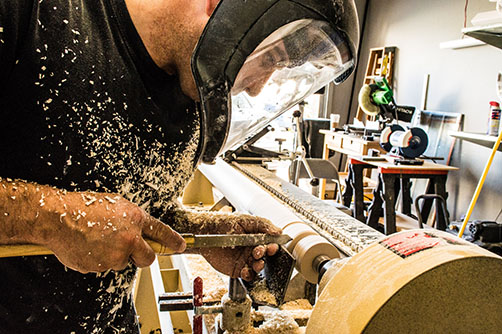New project to boost social innovation in Jönköping region
Jönköping International Business School (JIBS) is collaborating with Coompanion Jönköpings Län in a project aimed at helping local businesses implement social innovation into their organisations. As part of the project, researchers at the Media, Management and Transformation Centre (MMTC) at JIBS will carry out research into local small and medium-sized enterprises (SMEs) to find out what activities they are already doing and what support they need to continue working with social innovation.
.jpg)
Small woodworking businesses providing sawdust waste as fuel for another company - this is an example of social innovation that often goes unnoticed in the Jönköping region. (Image is generic and unrelated to a specific company.) Credit: Unsplash.
“We want to bring together all the activities already being done and, added with our research knowledge, create one social innovation platform for the region that can be run in a systematic and sustainable way,” says Duncan Levinsohn, Assistant Professor at JIBS and coordinator for the research side of the project.
Between 2016-2020, the business development association Coompanion Jönköpings län and Jönköping University collaborated on the research project SIRU to create awareness of social innovation and how it can benefit the Jönköping region. Now JIBS is taking part once more in the follow-up project, SIRU 2.0, which aims to help regional businesses implement social innovation activities.
“People are used to looking to big corporations for large-scale examples of social innovation, but good things are also happening on a smaller scale, for example, a small village woodworking business that is providing sawdust waste to another company to use as fuel, or a company that’s taking new steps to diversify their workforce. When you add all these small innovations together, it can have a big impact,” says Duncan Levinsohn.

Assistant Professor Duncan Levinsohn is research coordinator for SIRU 2.0.
According to Levinsohn, whilst larger companies might ‘green-wash’ their activities, SMEs in fact often do the very opposite.
“SMEs tend to ‘hush-wash’ their sustainability actions, that is, they don’t tell anyone they are doing it. As a result, they miss out on valuable support or partnerships. If we want to make social innovation in the region sustainable and long-term, then there needs to be more coordination of activities,” he explains.
The first phase of the project will be to create case studies of SMEs in the region who are actively taking new steps to bring sustainability into their business. This work will be complemented with a questionnaire, designed in collaboration with Värnamo Näringsliv and CSR Småland External link, opens in new window., that will be sent out to around 150 SMEs. The questionnaire will ask them what new things they have done recently in terms of social innovation, if they have collaborated with others, and if there is something stopping them from doing more.
“SMEs want to be sustainable, but it’s hard enough keeping your company afloat these days, especially during a pandemic. How can they build their business back up in a better way post Covid? How can we help them find the time for social innovation? What drives their social innovation engagement? Their reasons for carrying out social innovation aren’t always about the bottom line, it’s often about a passion for their local community, or perhaps an interest in social issues linked to personal experiences. We need to listen more to SMEs and build social innovation based on the passions of individual owners and CEOs,” emphasizes Duncan Levinsohn.
Helping small businesses engage in sustainability is something that JIBS is already committed to. In Autumn 2021, the school is also launching three courses: Accelerating a Sustainability Transition, Sustainability for SMEs (given in Swedish), and Sustainability and ownership – all three aimed at helping business practitioners and family business owners increase sustainability in their companies.
“We want to make Jönköping the most sustainable region in Sweden, and in turn make Sweden a bigger player globally. We cannot rely on the Swedish public sector alone to achieve this. Small businesses play a big part in society, so it’s crucial we get them involved,” concludes Duncan Levinsohn.
SIRU 2.0 started up in January 2021 and will be running until April 2023. The project is part of a larger theme within the Media, Management and Transformation Centre (MMTC) on ‘SMEs and Sustainability’. Also engaged in the project are MMTC members Guénola Nonet and Mark Edwards.
For more information, please contact Duncan Levinsohn.
